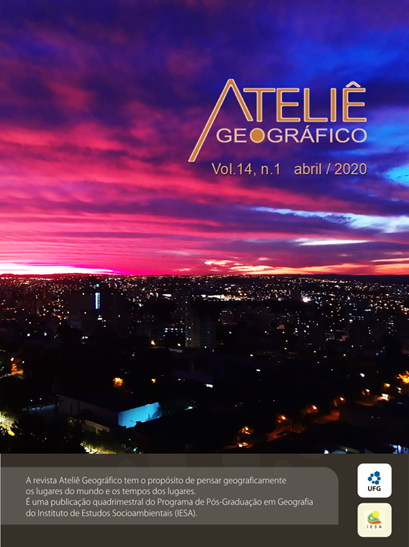State of natural vegetation conservation across the landscape temporal changes in Paraguai/Jauquara Hydrographic Basin, in Mato Grosso – Brazil
DOI:
https://doi.org/10.5216/ag.v14i2.57295Abstract
The aim of this study is to analyze the changes in the landscape structure and its effects on the conservation of natural vegetation in the Paraguay/Jauquara-MT Hydrographic Basin. The study is justified by the importance of the hydrographic region and its sub-basins in the contribution of the flood pulse of the Pantanal in Mato Grosso state. In the study, images from the Landsat-5 and 8 satellites were used, classified by land use and land cover in the years 1997, 2007 and 2017. Seven landscape metrics were applied to analyze the changes that occurred over the 20-year period, through measures of area, fragmentation, size, connectivity and isolation from natural vegetation. The results indicated that 19% of the natural vegetation was converted by pasture, 14% between 1997 and 2007 and 4% between 2007 and 2017. Agriculture was responsible for 1% of the vegetation between 1997 and 2007, which also contributed to fragmentation and an increase in the degree of isolation from the remaining vegetation in the basin. Therefore, it is suggested that efficient measures be adopted in environmental management, as the alteration of the natural vegetation in the study area may affect the geosystems and the flood pulse of the Pantanal plain.
Keywords: remote sensing, geotechnology, landscape ecology, environmental conservation.
Downloads
Downloads
Published
How to Cite
Issue
Section
License
Autores que publicam nesta revista concordam com os seguintes termos:- Autores mantém os direitos autorais e concedem à revista o direito de primeira publicação, com o trabalho simultaneamente licenciado sob a Licença Creative Commons Attribution que permite o compartilhamento do trabalho com reconhecimento da autoria e publicação inicial nesta revista.
- Os autores não serão remunerados pela publicação de trabalhos na Revista Ateliê Geográfico. Além disso, os conteúdos publicados são de inteira e exclusiva responsabilidade de seus autores, ainda que reservado aos editores o direito de proceder a ajustes textuais e de adequação às normas da publicação.
- Autores têm permissão e são estimulados a divulgar seu trabalho online (ex.: em repositórios institucionais ou na sua página pessoal), já que isso pode gerar alterações produtivas, bem como aumentar o impacto e a citação do trabalho publicado (Veja O Efeito do Acesso Livre).


